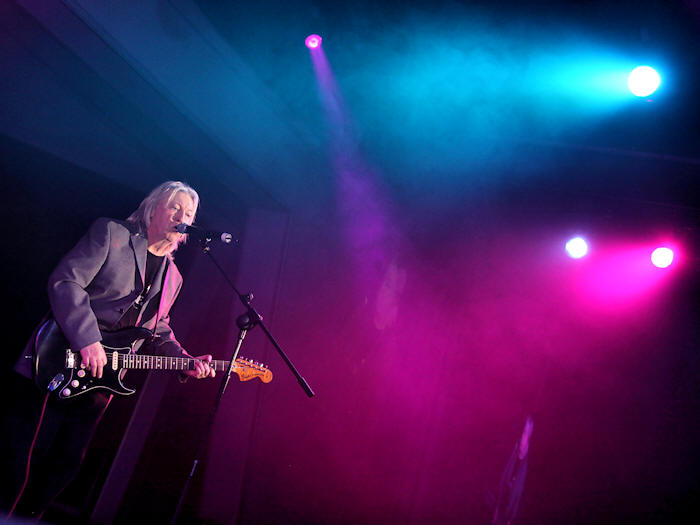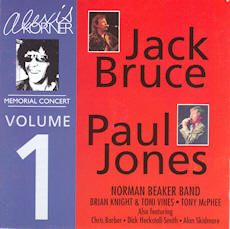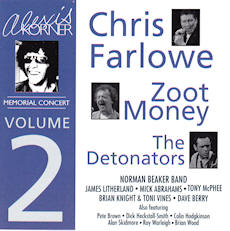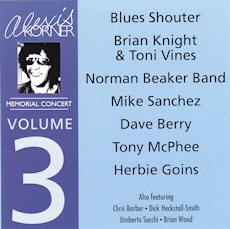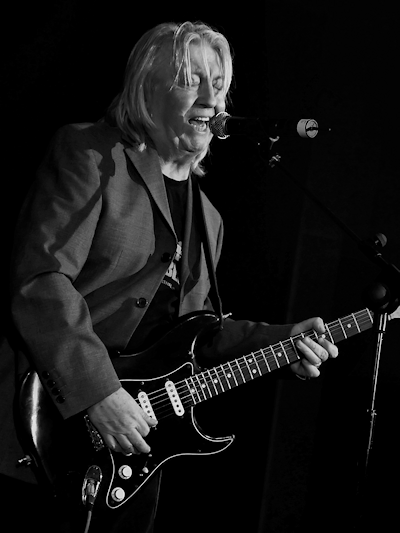
Painting © 2004 Loz
Arkle
Website
© Copyright 2000-2011 Alan White - All
Rights Reserved
Site optimised for Microsoft Internet Explorer
Early Blues Interview
|
||||||
|
Guitarist/singer/songwriter/producer, Norman has been
involved in the British blues scene since the early 1970s,
leading a five piece band reckoned to be one of Britain's best and most
original blues bands; their legendary live performances played with a
lot of emotion, a lot of excitement but also with a lot of humour.
I caught up with Norman and the band at the Skegness Rock and Blues Festival. Alan: What are your first musical memories growing up in Manchester? Norman: The major memories are that my brother, Malcolm, was really mad on blues music. I was more into the pop but heís 3 years older than me so he used to go and see Howliní Wolf and these people, tell me about them and I just gradually picked it up from his records. The record that really got me turned on to blues music was probably Five Live Yardbirds. I heard it and thought that I didnít really get it so I started looking at it and Iíve been hooked on it ever since. Alan: Did you come from a musical family? Norman: No, not really. My Dad used to play piano and accordion badly and my Mum had a few piano lessons but my brother was a drummer. I was crazy about playing. I had a road accident when I was 7 and I had to stay in bed for 18 months so my Dad bought me a guitar to pass the time and thatís how it all started so I had a lot of time on my own to learn. Alan: What kind of material were you playing in the early days? Norman: Mainly blues, I suppose, although even when I tried to play pop music people used to say that it sounded like blues, even though I wasnít really sure what blues was. Even years later when I played in restaurants and stuff for a few quid, people used to say, ďOh, we like your bluesĒ so I think itís a lot to do with the way you play. If I was playing Fly me to the Moon itíd probably still sound like a blues number. Alan: So what does the blues mean to you? Norman: Itís a fantastic way of venting your feelings when you are playing, more so than a lot of music. Itís mainly ad-libbed so you get a lot of yourself into it. I always think that musicians, given a chance, pretty much play the way they are in real life. You know, if they are a bit shy like Peter Green, he plays in a very withheld way but if youíre more outgoing and crackers like me then you play in that sort of cheeky way. So I think itís a way of getting your personality out. Alan: In 1967 you formed your first band 'Morning After', together with brother Malcolm on drums, Ian Stocks on bass and John McCormick on keyboards. Tell me about those early days, what type of blues were you playing? Norman: They were great. Youíd do anything for a performance and we used to play every single night and I remember we didnít have one night off in two years. If you got a night off you felt ashamed of yourself Ė you had to gig. What else would you do? I remember that we were so tired once when we finished touring and I came home on the Friday night and I went to the cinema and thought Iíd go and see and the match because I hadn't seen one for months (Iím a big Manchester United fan Ė not the Blues!) but I went home after the cinema and didnít wake up until Sunday evening. So I think I needed the break!
Alan: Your real name is Norman Hume but nobody knows you are that. Is it true that you got the name ďBeakerĒ from Victor Brox? Norman: Thatís right. His real name is Victor Hickling so we were discussing names and I said that I could see why he changed it and he said, ďWell, Victor was my grandfatherís nameĒ and I said that I thought Iíd change mine. ďWhat?Ē, he said. ďChange Norman? The only people to conquer Britain and assume a great British name? You could be a direct descendent of the Beaker folk Ė you know, the Neolithic man. The following night we did a television programme and he just said, ďAnd Norman Beaker on guitarĒ and the following day somebody phoned me up and said, ďMr Beaker, Iíve got this blahĒ and within minutes almost it was there. I still do a double-take when anybody says my name.
Norman: With the blues thing it can be a great place for making you feel bad or good, whatever and I think you need to balance it. The music I play is pretty serious and is lyrically quite serious. Iím crazy about old comedy, you know Tony Hancock and that crowd, and Iíve always been someone whoís always joked and messed about. When Iím with Chris Farlowe we are always scoring off each other and people love it, they donít get upset by it at all, they think it adds to the entertainment. Although you still kinda play music with feeling, you are still in the entertainment business, although obviously it canít take over your music. Alan: Who has influenced you the most in your music writing and playing? Norman: Probably Stevie Wonder in the writing, although I donít really write that sort of stuff but I like his ideas. Playing-wise, as far as blues goes, probably Freddie King. Alan: Are there any particular songs you play that have special meaning to you? Norman: Most of them really. Modern Days, Lonely Nights was about having everything. I remember I had all these albums, DVDs, and this and that and everybody was out of the house and I just thought, oh, modern days...so yes, I do think about where songs were written. Alan: Youíve been on the British Blues Scene for 3 decades. Norman: Only 3? I think itís just 4 now! Alan: Okay, 4 now! Youíve played with such greats as Chuck Berry, Jack Bruce, Alexis Korner, Buddy Guy and BB King. You must have some special memories? Norman: Well, it sounds a bit trite but Iíve had a really good time. When I set out playing all I wanted to do was play with really great musicians. Well, with my band Iíve got some not bad ones but it doesnít always go far enough (much raucous laughter from his band mates listening in!) but people like Jack Bruce were all my heroes. They were all about ten years older than me so of course itís just fantastic when you play with people whose records you used to buy. Iíve been lucky that way.
Alan: I understand that in the 90s you did some producing work? Do you still do that? Norman: Yes, I still do that, we did Ruby Turnerís album. Itís better with your own band, for example on Chrisís album, in fact thatís how we got together when Pete was producing his album. The band we had at the time were good players but they didnít really do it for this album so I said I would produce it but I want to use my band and weíve been with him for 16 years. Alan: Tell me about the current Norman Beaker Band, when did you get together? Norman: Iíve been together with John Price, the bass player, for about 20 years now. The band got together in about 1982, mainly because of the transition of musicians coming in and we had a name such as No Mystery and I always thought it a bit unfair if people turned up and it was a different drummer or a different sax player but if itís my band then theyíre going to see me. Not one of the members has ever been asked to join and they canít leave either! Alan: When did you first meet Larry Garner? Norman: Oh, probably 15 years ago. He was fantastic, I loved him. We were the first band that he played with when he came over, so we had a great time and he stayed with us and we got really friendly. But then he got a quite big deal with Epic I think in the States so he didnít come over quite so much and we were doing other stuff so we didnít meet up for about 15 years and then he got on touch through Facebook. So I asked him when he was coming to England again and he said, ďWhen do you want meĒ so I spoke to Toni Weeks, the agent, and she put a tour together. Alan: This year sees the first Yorkshire Blues Festival. How did you get involved with that with Rudi Enos? Norman: I did the Alexis Korner Memorial Concert at Buxton and met up with Rudi. He went to them all and just loved the shows. He wanted to try and get it back together again. He knew that I was sort of a catalyst for it, you know, I could tap a few people up to come and do a bit. Iím doing the easy bit really with the line-up but Rudy is doing all the hard stuff with the logistics.
Alan: According to the line-up youíve got a fantastic array of guests including Colin Hodgkinson, Zoot Money, Maggie Bell, Mike Sanchez, Cliff Bennett, Larry Garner, Geoff Whitehorn and Herbie Goins. How did you get all these eminent artists together? Norman: As soon as I mentioned Alexis, most people wanted to do it. Colin Hodgkinson was with Alexis for years, and Herbie of course. Weíre all friends together and itís not that difficult really. Even when we did the Buxton ones, Robert Plant came and did one, Jimmy Paige said, ďOh, Iíll do it with himĒ. Theyíd barely spoken for years and hadnít played together for 15 years and they turned up to that. So, itís great and it makes me feel good to keep his legacy going. Not me duty but I feel it should be done. Alan: Some music styles may be fads but the blues is always with us. Why do you think that is? Norman: I think it's a simple frame of music that most people can play. And they can, even if they might play it really badly it may be still good enough to get up and have a go and enjoy themselves. It never really gets more popular but it just seems to when thereís no movements. Thereís always been punk rock, or rock or whatever and when they start to come down, blues seems to get bigger and seems to resurface. Alan: Thank you very much for your time Norman, really appreciate it.
Photos of The Norman Beaker Band at Skegness Rock & Blues Festival
Return to
Blues Interviews List |
||||||








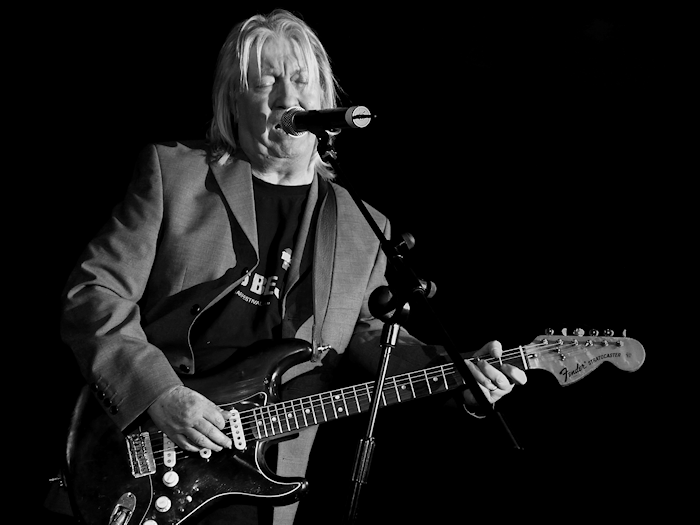
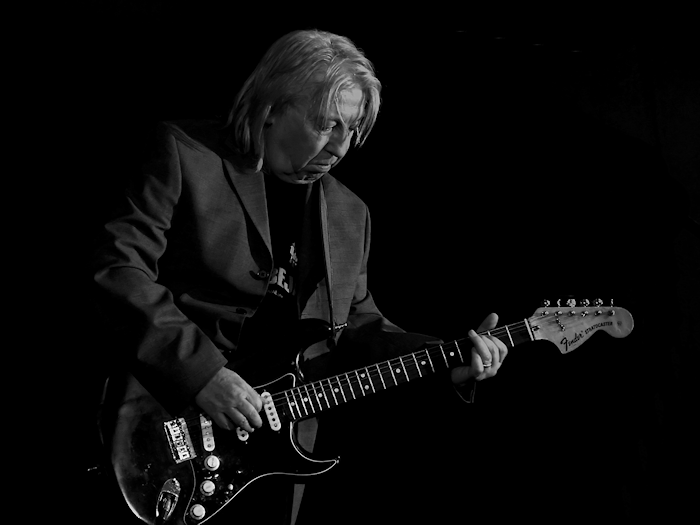
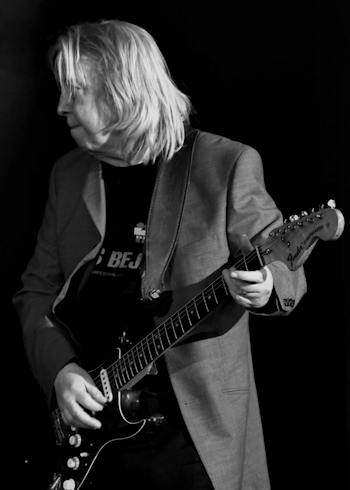 Alan: Following
the Morning After Band you formed a band called 'No Mystery'.
According to your biography you ďplayed the blues with a sense of
humour, gaining widespread admiration by other artistsĒ. Whatís all
that about?
Alan: Following
the Morning After Band you formed a band called 'No Mystery'.
According to your biography you ďplayed the blues with a sense of
humour, gaining widespread admiration by other artistsĒ. Whatís all
that about?